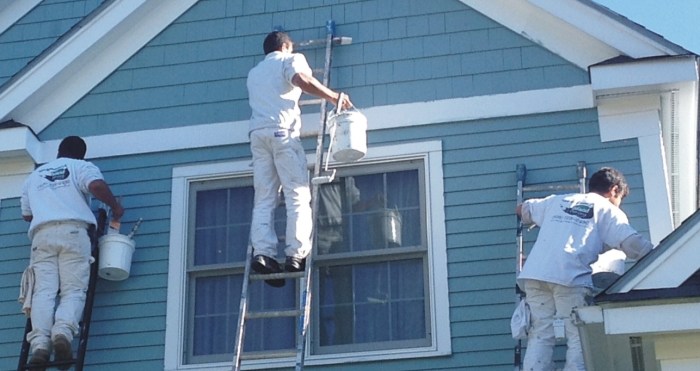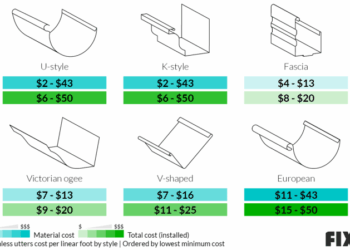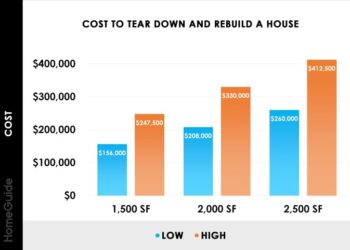Embark on a journey through the world of house painters, where expertise meets creativity to transform spaces into works of art. This guide is your gateway to understanding the nuances of this profession, from different types of painters to essential skills and safety measures.
Dive in and discover the secrets behind a flawless paint job.
Whether you're a homeowner looking to spruce up your living space or an aspiring painter seeking insight into this craft, this guide has you covered with valuable information and practical tips.
Types of House Painters
When it comes to house painters, there are several types that specialize in different areas to cater to various painting needs. Let's explore the different types of house painters and their specialties.
Interior House Painters
Interior house painters focus on painting the inside of homes, including walls, ceilings, trim, and other interior surfaces. They are skilled in techniques that ensure a smooth and even finish, paying attention to detail to enhance the overall look and feel of the interior space.
Exterior House Painters
On the other hand, exterior house painters specialize in painting the exterior surfaces of homes, such as siding, fences, decks, and exterior walls. They are knowledgeable in using weather-resistant paints and coatings to protect the exterior from the elements and enhance curb appeal.
Residential Painters
Residential painters work on homes and smaller residential properties, focusing on personalized painting services to meet the unique preferences of homeowners. They are experienced in working in living spaces and ensuring minimal disruption to the household during the painting process.
Commercial Painters
Commercial painters, on the other hand, specialize in larger projects such as office buildings, retail spaces, and other commercial properties. They are equipped to handle bigger workloads and have expertise in using specialized paints and coatings for high-traffic areas.
Skills and Qualifications
To become a successful house painter, certain skills and qualifications are essential. These include a combination of technical abilities, creativity, attention to detail, and good physical stamina. Let's delve into the specific requirements for aspiring painters.
Essential Skills for House Painters
- Proficiency in surface preparation techniques
- Knowledge of various types of paints and finishes
- Ability to work with different tools such as brushes, rollers, and sprayers
- Attention to detail for precision and neatness
- Good color sense and understanding of color theory
- Physical stamina for long hours of standing, bending, and climbing
Qualifications Needed to Become a Professional Painter
- High school diploma or equivalent
- Completion of a formal apprenticeship program or on-the-job training
- Certification or license may be required in some states
- Continuing education to stay updated on new techniques and materials
Training Programs for Aspiring Painters
- Trade schools and vocational programs offering courses in painting and decorating
- Apprenticeship programs through painters' unions or contractors
- Online courses and workshops for specific painting techniques
- Certification programs from industry organizations for added credibility
Tools and Equipment
Painters rely on a variety of tools and equipment to effectively and efficiently complete their job. From paintbrushes to advanced technology, each item plays a crucial role in achieving a professional finish.
Common Tools and Equipment
- Paintbrushes: Essential for precision work, high-quality paintbrushes help painters achieve smooth and even coats of paint.
- Rollers: Used for larger surfaces, rollers ensure quick and uniform application of paint.
- Drop cloths: Protecting floors and furniture from paint splatters, drop cloths are a must-have during painting projects.
- Painter's tape: Used to create clean lines and protect trim, windows, and other surfaces from unwanted paint.
- Ladder: Necessary for reaching high areas and ceilings, a sturdy ladder is crucial for safety and efficiency.
Importance of High-Quality Paintbrushes and Rollers
Investing in high-quality paintbrushes and rollers is essential for achieving professional results. Cheap brushes and rollers can leave behind streaks, bristles, or lint, compromising the overall finish of the paint job. Quality tools ensure smooth application, even coverage, and a clean finish, ultimately improving the overall appearance of the painted surface.
Role of Advanced Technology
Advanced technology has revolutionized the painting industry, offering painters new tools and techniques to enhance their work. From airless paint sprayers that provide a uniform coat of paint in less time to digital color matching systems that ensure accurate color selection, technology has made painting faster, more efficient, and more precise.
Painters who embrace these advancements can deliver higher-quality results and improve their overall productivity.
Preparation and Painting Process
Before diving into the painting process, proper preparation is key to achieving a smooth and professional finish. Here is a step-by-step guide to preparing a room for painting:
Step-by-Step Guide to Preparing a Room for Painting
- Remove furniture and cover floors with drop cloths to protect them from paint splatters.
- Clean walls thoroughly to remove dust, dirt, and grease. Patch any holes or cracks with spackling compound and sand smooth.
- Tape off trim, windows, and any other areas you want to protect from paint using painter's tape.
- Prime walls if needed to ensure better adhesion and coverage of the paint.
- Choose the right paint color and finish for the room, and stir well before applying.
Now, let's delve into the typical process followed by house painters when painting a house:
Typical Painting Process Followed by House Painters
- Start by cutting in the edges with a brush to create clean lines along ceilings, corners, and trim.
- Use a roller to paint large areas of the wall, working in sections and blending the paint for a seamless finish.
- Apply a second coat if necessary for full coverage and a more vibrant color.
- Remove painter's tape carefully before the paint dries completely to avoid peeling off the fresh paint.
Finally, here are some tips for achieving a professional finish in painting projects:
Tips for Achieving a Professional Finish
- Invest in high-quality paint and tools for better coverage and durability.
- Work in natural light to ensure accurate color selection and even application of paint.
- Take your time and work methodically to avoid mistakes and drips.
- Clean your brushes and rollers thoroughly after each use to prolong their lifespan and maintain quality results.
Safety Measures
House painters must prioritize safety while working to ensure a secure and accident-free environment. This includes following specific precautions to minimize risks associated with paint and chemicals, as well as safely handling ladders and scaffolding during painting projects.
Precautions for Working with Paint and Chemicals
- Avoid inhalation of paint fumes by working in well-ventilated areas or using respiratory protection.
- Wear protective clothing, gloves, and goggles to prevent skin contact and eye irritation from paint and chemicals.
- Store paint and chemicals properly in sealed containers away from heat sources to prevent accidental spills or fires.
- Dispose of paint waste responsibly according to local regulations to prevent environmental contamination.
Risks Associated with Paint and Chemicals
- Exposure to toxic chemicals in paint can lead to respiratory issues, skin irritation, and other health problems.
- Accidental ingestion of paint or chemical substances can result in poisoning, requiring immediate medical attention.
- Improper disposal of paint waste can harm the environment and contaminate water sources, affecting ecosystems.
Safe Handling of Ladders and Scaffolding
- Inspect ladders and scaffolding for damage before use to ensure stability and prevent accidents.
- Place ladders on a stable surface and secure them properly to prevent falls or tipping over during painting tasks.
- Use proper climbing techniques and never overreach while working on ladders or scaffolding to avoid injuries.
- Consider using safety harnesses or guardrails when working at heights to provide an additional layer of protection.
Cost Estimation and Budgeting
When it comes to hiring house painters, understanding the cost estimation and budgeting process is crucial for a successful painting project. House painters use various factors to estimate costs, which can vary depending on the size of the project, materials needed, labor involved, and other variables.
Factors Influencing Pricing
- The size of the project: Larger properties or rooms may require more paint and additional labor, impacting the overall cost.
- Type of paint and materials: High-quality paints or specialty finishes can increase the cost compared to standard options.
- Surface preparation: Extensive prep work, such as repairing damaged walls or sanding surfaces, can affect the pricing.
- Accessibility and complexity: Areas that are hard to reach or intricate designs may require more time and effort, influencing the final price.
- Location: Prices can vary based on the region, competition, and demand for painting services in the area.
Tips for Budgeting
- Get multiple quotes: Obtain estimates from different house painters to compare prices and services offered.
- Specify your needs: Clearly communicate your expectations, including the scope of work, desired finish, and any special requests, to avoid unexpected costs.
- Plan ahead: Schedule the painting project during the off-season or when painters have availability, which can lead to potential discounts.
- Consider long-term value: Investing in quality materials and professional painters may cost more upfront but can save money in the long run with durable results.
Closure

As we conclude our exploration of house painters, remember that a fresh coat of paint has the power to breathe new life into any environment. Armed with knowledge from this guide, you're ready to embark on your painting journey with confidence and finesse.
Top FAQs
What are the different types of house painters?
House painters can specialize in interior painting, exterior painting, residential painting, or commercial painting.
What are the essential skills required for house painters?
Essential skills for house painters include attention to detail, color matching, surface preparation, and using various painting techniques.
How do house painters estimate costs for painting projects?
House painters estimate costs based on factors such as the size of the area to be painted, the type of paint needed, labor costs, and any additional materials required.
What safety precautions must house painters follow?
House painters should wear protective gear, ensure proper ventilation when working with paint fumes, and follow correct ladder and scaffolding safety protocols.









